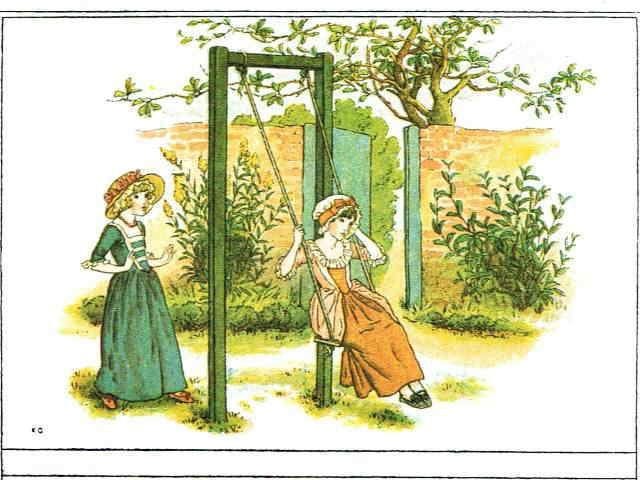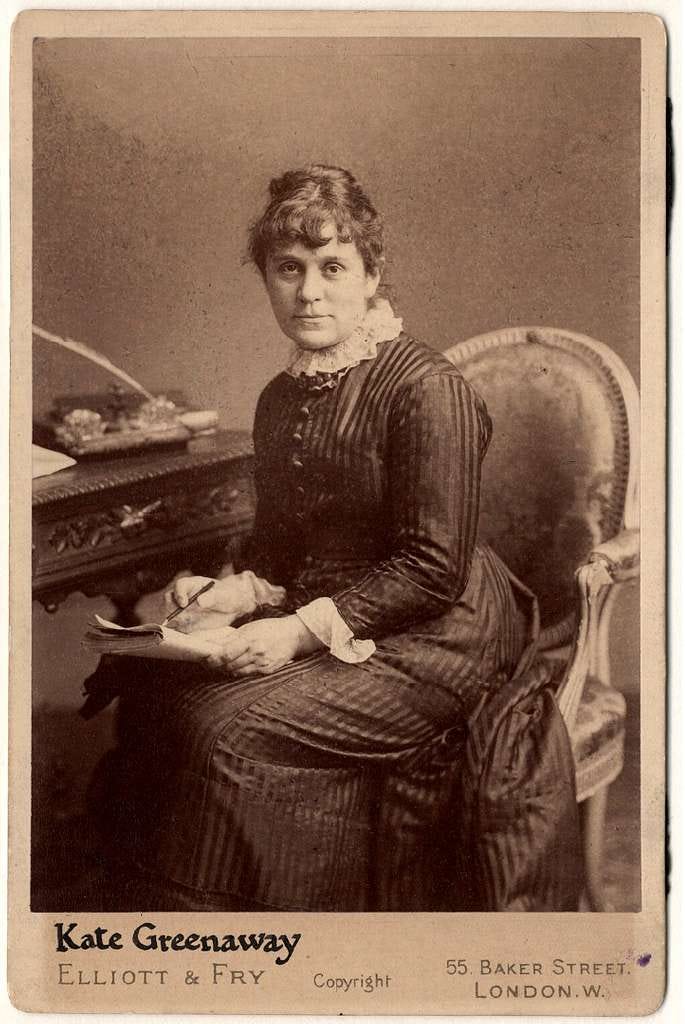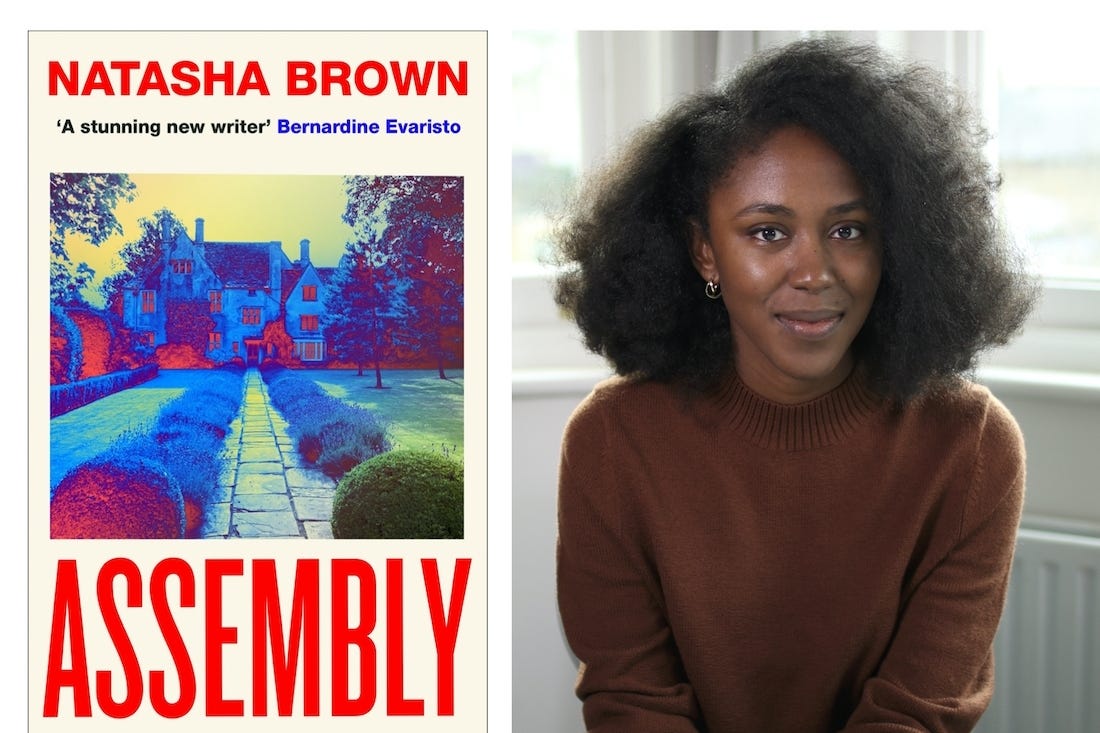The July Nutshell
Kate Greenaway, book banning, birth stories, and Roman Roy
Dear Reader,
It is the 1st of August and I’m a day late with my nutshell. Today I was also a day late delivering the structural edit* of my forthcoming time-slip novel co-written with Nova Weetman (similar to but not the same as Elsewhere Girls). Of course, these two things are intimately connected. But here I am! Book finished (half-book finished: the beauty of co-writing) and hoping that while I write this nutshell I’ll find my newsletter mojo again.
For, yes, I’m low on mojo since my trip to the UK, but I’m hopeful . . . it’s here, somewhere. I’d especially like to thank readers with a paid subscription for their patience. I paused payments in June because I knew I wouldn’t be able to deliver anything. This month I’ve tried to get back into the swing of things but looking at my output I need one more really good push . . .
The Kate Greenaway Medal
This illustration of two girls, one on a swing, is by Kate Greenaway. In my recent post, Bibliophiles R Us, there was a note about my great-great-grandfather, a Victorian art dealer who was a great fan of illustrators and counted Kate Greenaway as a friend. If you’re a children’s literature enthusiast you’ll know that the famous Carnegie awards included The Kate Greenaway Medal for illustration until 2022 when the organisers decided to remove Greenaway’s name from the medal and replace it with the name of the award sponsor, Yoto, an audio technology company. It is now the Yoto Carnegie Medal for Illustration. (Boo-hiss.)
Kate Greenaway was a shy, interesting, determined woman from a working-class family who was prevented from studying art techniques as freely as her male counterparts by the restrictions of the nineteenth century, but made a name for herself. Like the creators of this petition — Bring Back the Kate Greenaway Medal — I’d love to see her name restored to this award.
Book Banning
In one of my June posts, The Long-Haul Flight Edition, I recommended Jon Ronson’s BBC podcast Things Fell Apart, particularly the episode ‘Dirty Books’ about an attempt in West Virginia in the 1970s to ban hundreds of text books. I’m repeating this recommendation after events in Australia this month. What the episode ‘Dirty Books’ does well is to show how a single — often false or misinterpreted — piece of information can be used to distort the public view and create outrage, leading to calls to ban books and harm their creators.
This month in Australia we saw a concerted effort to have a book removed from bookshops. It’s called Welcome To Sex by Dr Melissa Kang and Yumi Stynes, published by Hardie Grant Children’s Publishing, and is described on the publisher’s website as “a frank, age-appropriate introductory guide to sex and sexuality for teens of all genders”. I couldn’t possibly do this matter justice in a round-up post. However, a significant part of the way this debate became so abusive and divisive I believe stems from one comment allegedly made by one of the authors, that she’d be happy with a mature 8 year old having a look at the book even though it is aimed at those in adolescence — I’m paraphrasing, like everyone else, I don’t know exactly what the co-author Yumi Stynes said but frankly it doesn’t matter because it’s what the book achieves and what research backs it up that matters. But the organisers of this book-banning expedition were able to amplify this comment alone, to the extent that for many people this translated into: your 8-year-olds are going to be forced (somehow) to see the contents of this book whether you want them to or not unless you demand the book’s removal ( . . . and P.S. everyone who created it or supports it is a “groomer”.)
It isn’t logical, it’s just how book-banning works. And it did work, to an extent. Except that it quickly backfired, resulting in huge sales of Welcome to Sex. I liked this helpful article in The Conversation, Big W has withdrawn Welcome to Sex from its stores to protect staff – but teen sex education can keep young people safe.
Could it be that some of the people who fought strongly against this book on social media (and it has been vile) actually fall somewhere in the murky middle but were pulled to the wrong side by (1) a misleading statement, and (2) an emotion that can become a toxic brew inside all parents: fear? I would not have freely given Welcome To Sex to my children when they were 8. My children were not ready for this book at 8 and I wasn’t ready for them to be ready. That should never have been the point. The book has always been for adolescents. Nevertheless this skewing of the facts has led to death-threats and violent, graphic, racist abuse against one of the authors.
Anyway, listen to ‘Dirty Books’ and let me know what you think.
Birth Stories
I’ve said before that my reader-antennae love to twitch when a common theme of the month emerges. A few months ago the theme was DOORS and I wrote about that in How To Use A Door according to Andy Griffiths, Maeve Brennan, Suzanne Leal and Magda Szabó. This month, the theme was PREGNANCY & BIRTH.
There’s a harrowing account of 1930s childbirth in Barbara Comyns’ Our Spoons Came From Woolworths, told in the same plainly declarative style as the rest of the book, which I found so affecting. I wrote about Comyns being my flavour of the month in a post for paid subscribers called Where’ve You Been All My Reading Life?
In Life Among the Savages, the 1950s memoir by Shirley Jackson, an account of giving birth to her third child is hilarious (while horrifying), and a new podcast from Serial, The Retrievals, explores the experiences of patients at a fertility clinic who were denied pain relief not only by a scamming nurse but also by a system that fails to take female pain seriously.
In fact the theme in all three of these is ‘women’s pain being ignored or minimised by the medical profession’. If you feel up to that theme I highly recommend these.
Recap
This month on Voracious, in addition to this nutshell free subscribers can read:
How To Make Plot Decisions, or The Time I Killed And Did Not Kill The Dog, featuring The Beatles, my middle-grade novel The Goodbye Year, and a useful refrain from the picture book We’re Going On A Bear Hunt.
Bibliophiles R Us, featuring my great-grandfather’s handwritten catalogue of his personal library, and some excerpts from his 1920s diary.
Paid subscribers can also read:
Where’ve You Been All My Reading Life?, featuring four writers.
Bad, Bad Characters
Confession: I watched all four seasons of Succession this month. I thought it was the most compelling, horrible, brilliant show. I could see so much of my favourite comedy, Peep Show — another of Jesse Armstrong’s creations — in the way I became attached to, even fond of against my will, the children of the Rupert Murdoch character Logan Roy. Fond feelings for Roman Roy . . . how did the writers do that to me? What an achievement, to make a viewer so consciously aware of the slipperiness and perplexity of morality and sympathy. Succession was Shakespearean. I am in a recovery programme that relies heavily on Idris Elba in Hijack (Apple TV).
Final Word
In July I read a big fat book that I didn’t connect with. It was like seeing a generous sofa and imagining the luxury of sitting in it but then plonking my backside down and finding it has no give, just a lot of fancy material that feels a little creepy under the skin.
But I followed that with a book like a bonsai tree — perfectly formed and containing all the details a tree would need so that you would wonder why any tree would need to be bigger than that.
And that book is Assembly by Natasha Brown.
Thank you for reading Voracious. Please feel very welcome to comment on or share this post. You will find my other nutshells by visiting emilygale.substack.com and clicking the Nutshells heading. I have all posts divided into categories to help you to navigate: Writers on Writing, Children’s Books, Industry Talk, and Writers on Reading. Public posts are available for 4 weeks from publication. They are then archived and can be accessed at any time by paid subscribers.
*structural edit: if you don’t know this term, this is the big one, where you may remove whole story strands, introduce new characters, get rid of others, tear down and rebuild. I have written about editing on Voracious in Upcycling For Writers, and The Truth About Manuscript Assessments.







The book banning was awful - I don't get why people feel the need to control what books we have access to, as it's not a book that was harmful. People can simply not read a book if they disagree with it.
Kate Greenaway fascinates me - I have a book of her illustrations that my uncle gave me years ago somewhere. I first became fascinated with her when I studied children's literature at uni. I'm getting some insight into what I can include in my posts from yours as well - I need to sit down and put some ideas for so many things together.